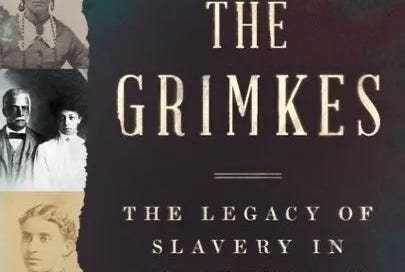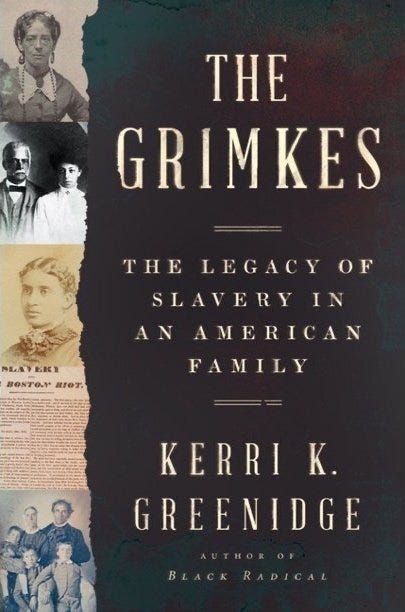In Episode 2 of “Why Now?” Kerri Greenidge talks to us about her new book, The Grimkés: The Legacy of Slavery in an American Family (Liveright, 2022.) Greenidge is Mellon Assistant Professor in the Department of Studies in Race, Colonialism, and Diaspora at Tufts University and an expert in abolitionism and 19th-century African-American history. She is also the author of the prize-winning biography Black Radical: The Life and Times of William Monroe Trotter (W.W. Norton, 2019.)
As in the Trotter biography, in The Grimkés, Greenidge reopens what many historians believed to be a well-known story about white women and the social movement to abolish slavery in the United States. But in The Grimkés, this talented scholar and storyteller significantly revises historian Gerda Lerner’s 1967 account of Sarah and Angelina Grimké, white sisters from a South Carolina slaveholding family who became abolitionists.
Unlike Lerner, Greenidge addresses the limits of the white Grimkés’ vision for Black freedom and their unwillingness to confront the truth of their own family history. But the book is also the story of the Black Grimkés, their path to freedom and influence, and their leadership role in the post-slavery era. Centering Henry Grimké’s Black children, their families, and their descendants in a family story that stretches for over a century, Greenidge demonstrates the strength of the generations coming out of slavery and the limits of elite politics, Black and white.
Greenidge stresses the simultaneous and rich history of Black abolitionism in the antebellum years and the anti-Black violence that many Northern white activists failed to address—even when it occurred right outside their doors.
The Grimkés asks crucial questions about the intellectual and political limits of abolitionism, the forms of racism that accompanied and evolved from enslavement, and what it cost the Black descendants of white, slaveholding families to make ambitious new lives in the decades after Emancipation.
Program notes:
Interested in buying the book? Read a review of The Grimkés by Michael P. Jeffries in the New York Times. (October 29, 2022)
The opening music is excerpted from “Song of the Abolitionist,” performed by the Dutchess Antislavery Singers, and initially published in The Liberator on December 31, 1841. The song was written by The Liberator’s publisher, Boston abolitionist William Lloyd Garrison, and sung to the tune of Auld Lang Syne.
In addition to Gerda Lerner’s book, you might want to read Mark Perry’s Lift Up Thy Voice: The Grimké Family's Journey from Slaveholders to Civil Rights Leaders (New York: Viking Press, 2001.)
Listeners might also be interested in biographical material about Francis James Grimké in Thabiti Anyabwile and John Piper’s The Faithful Preacher: Recapturing the Vision of Three Pioneering African-American Pastors (Wheaton, IL: Crossway, 2007.)
How did white women understand their participation in abolitionism as a racial task? See Mary Catherine Cain, “Rhetorics of Race and Freedom: The Expression of Women's Whiteness in Anti-Slavery Activism,” Studies in Popular Culture Vol. 29, No. 2 (October 2006), pp. 1-19.
Listeners can learn more about the crucial role that free and enslaved Black women played in the fight to end slavery in Martha S. Jones, Vanguard: How Black Women Broke Barriers, Won the Vote and Insisted on Equality for All (New York: Basic Books, 2020.
Claire and Kerri drew parallels between Henry Grimké fathering Black children with an enslaved woman and Thomas Jefferson’s own Black descendants, referencing historian Annette Gordon Reed’s Thomas Jefferson and Sally Hemings: An American Controversy (Richmond: University of Virginia Press, 1998.)
Listeners can further explore Angelina Weld Grimké's significance as an American modernist writer in Maureen Honey’s book Aphrodite's Daughters: Three Modernist Poets of the Harlem Renaissance (New Brunswick: Rutgers University Press, 2016.)
You can listen to this podcast by downloading from this newsletter, or you can subscribe for free on Apple iTunes, Spotify, or Soundcloud.
Short Takes:
It looks like the election-denying, Trump-fluffing conspiracy theorist Kari Lake may become Arizona governor. The news from that state is not all bad, though, as Sam Brodey reports at The Daily Beast: “One Democratic operative from Arizona, who requested anonymity to speak candidly, said a Hobbs win is still possible, but predicted that Democrats’ ceiling on November 8 might consist of Sen. Mark Kelly (D-AZ) winning re-election and Adrian Fontes defeating the 2020 truther Mark Finchem in the contest for secretary of state.” (November 2, 2022)
Half of the people who work at Twitter (that’s 3700 tech workers) will be unemployed by Friday. According to Edward Ludlow and Kurt Wagner at Bloomberg News, “Layoff lists were drawn up and ranked based on individuals’ contributions to Twitter’s code during their time at the company, the people said. The assessment was made by both Tesla personnel and Twitter managers.” The remaining employees will no longer be permitted to work remotely. However, since Musk’s plan seems to be to work them like mules because he paid too much for a platform that has only had two profitable years in its entire existence, the survivors may soon be streaming for the exits too. (November 2, 2022)
If you are in the Boston area, drop by the Schlesinger Library to see the new exhibit about Roe v. Wade, curated by legal historian Mary Ziegler. Jenny Schuessler of the New York Times writes that the exhibit “aims to break down any simple understanding of how the Supreme Court’s 1973 decision in Roe v. Wade has shaped America.” It also depicts an honest debate about reproductive rights and shows how the abortion debate implicates other aspects of human existence. As Schuessler reports, “The exhibition draws deeply from a huge collection acquired last year from the Sisters of Life, a Roman Catholic order founded in 1991 by Cardinal John Joseph O’Connor of New York to `promote life’ and discourage abortion and euthanasia.” (November 2, 2022)














Share this post